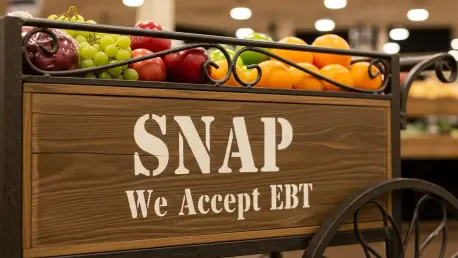What happens when a state draws a line in the sand against federal authority, prioritizing the privacy of its most vulnerable citizens over governmental demands? In Kansas, a fierce battle is unfolding as state officials reject a request from the U.S. Department of Agriculture (USDA) to hand over sensitive personal information of Supplemental Nutrition Assistance Program (SNAP) recipients. This isn’t just a bureaucratic disagreement; it’s a high-stakes showdown affecting over 200,000 Kansans who rely on SNAP benefits. The clash raises urgent questions about where the balance lies between governmental oversight and individual rights in an era of rampant data breaches.
Why Kansas Is Defying Federal Pressure on SNAP Data
At the core of this conflict is Kansas’s resolute refusal to comply with a USDA mandate for detailed personal data, including Social Security numbers and addresses of SNAP recipients. This marks the second time the state has pushed back against such demands, citing profound concerns over the potential misuse of information. State officials argue that creating a federal database for inter-agency sharing could expose citizens to significant risks, especially in a digital landscape where data leaks are increasingly common.
The standoff isn’t merely about data; it symbolizes a deeper resistance to perceived federal overreach. Kansas authorities are standing up for the principle that personal information should not be casually shared, even under the guise of administrative necessity. This defiance highlights a growing trend among states questioning the boundaries of federal power when it comes to sensitive citizen data, setting the stage for a broader national debate.
The Wider Implications: Privacy Versus Federal Control
Zooming out, this issue reflects a critical tension between state autonomy and federal mandates in the realm of social welfare. SNAP, a vital program supporting millions nationwide, inherently involves handling delicate information that, if mishandled, could lead to identity theft or other harms. Kansas’s hesitation mirrors a national unease, as recent studies indicate that 81% of Americans worry about how government agencies manage their personal data, according to a Pew Research Center survey.
Beyond Kansas, several states are grappling with similar dilemmas, wary of federal initiatives that could centralize personal information without ironclad safeguards. The fear is not unfounded—high-profile breaches, like the 2015 Office of Personnel Management hack exposing millions of records, serve as stark reminders of the stakes involved. This situation underscores a pressing need to reevaluate how privacy is protected within the framework of public assistance programs.
Unpacking Kansas’s Stance: Privacy, Law, and Practicality
Delving into the specifics, Kansas’s noncompliance rests on a trifecta of concerns. Privacy stands paramount, with state leaders cautioning that releasing data on over 200,000 SNAP recipients could jeopardize their confidentiality, especially if shared across federal agencies without clear restrictions. The potential for unauthorized access or data leaks weighs heavily on the decision, as officials prioritize shielding citizens from harm over meeting federal expectations.
Legally, the state treads cautiously amid a multi-state lawsuit challenging the USDA’s authority to demand such extensive information. Although Kansas is not a direct party to the litigation, complying now could expose the state to liability if the courts rule against the USDA. Additionally, the logistical challenge of compiling vast datasets within a tight deadline—deemed unreasonable by state administrators—adds another layer of resistance, as it would strain already limited resources and manpower.
Kansas Leaders Speak Out on Protecting Citizens
Leading the charge is Laura Howard, Secretary of the Kansas Department for Children and Families (DCF), whose firm stance encapsulates the state’s protective ethos. In a direct letter to USDA senior policy advisor Gina Brand, Howard emphasized the risks of compliance during ongoing litigation, stating, “The confidentiality of our citizens must take precedence.” Her position reflects a deliberate choice to safeguard personal information over yielding to external pressure, framing the issue as a moral imperative.
Howard’s perspective also introduces a note of pragmatism, as she indicated a willingness to reassess the state’s position pending the lawsuit’s outcome. This balance of resolve and flexibility suggests that while Kansas remains steadfast, it is not entirely dismissive of potential compromise. Her leadership in this matter amplifies the voices of thousands of SNAP recipients whose privacy hangs in the balance, giving a human dimension to an otherwise administrative conflict.
Finding a Path Forward: Balancing Rights and Responsibilities
As this dispute unfolds, actionable solutions emerge for states, advocacy groups, and citizens navigating the intersection of privacy and federal oversight. One viable approach is for states to bolster legal defenses by supporting or joining challenges against questionable mandates, thereby reinforcing their autonomy. Kansas’s current strategy of monitoring litigation outcomes could serve as a model for others facing similar pressures, ensuring decisions are informed by judicial clarity.
Another avenue lies in technological innovation—investing in secure, encrypted data systems that allow compliance without compromising confidentiality. Such systems could mitigate risks while meeting federal needs, offering a practical middle ground. Additionally, raising public awareness about data rights empowers SNAP recipients to hold both state and federal entities accountable, fostering a culture of transparency and vigilance in how personal information is handled.
In reflecting on this standoff, it becomes evident that Kansas’s refusal to share SNAP data with the USDA is rooted in a deep commitment to its citizens’ privacy, coupled with legal caution and practical constraints. The state’s actions stand as a testament to the importance of safeguarding vulnerable populations against potential data misuse. Looking ahead, stakeholders must advocate for robust data protection laws, push for clearer federal guidelines on information sharing, and ensure that social welfare programs operate with both efficiency and empathy. This saga serves as a reminder that privacy remains a fundamental right worth defending, urging all parties to prioritize trust and security in future policy decisions.









